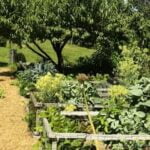Are cedar chips safe for vegetable gardens? It’s a question that many gardeners consider when looking for natural solutions to improve soil health and control pests.
In this article, we’ll explore the properties and composition of cedar chips, address concerns and considerations about their safety, and discuss the benefits of using cedar chips in vegetable gardens. Additionally, we’ll provide practical tips on how to use cedar chips effectively, potential risks to be aware of, and alternative organic mulching options for those who may have concerns about using cedar chips.
Cedar chips are a popular choice for gardeners looking for a natural way to enhance their vegetable gardens. With their ability to improve soil health and deter pests, understanding the benefits of using cedar chips can help gardeners make informed decisions about their use in their own gardens.
In this comprehensive guide, we will delve into the properties and composition of cedar chips, address any safety concerns associated with their use in vegetable gardens, explore the various benefits they offer for soil health and pest control, provide guidance on proper application techniques, discuss potential risks such as allergies and environmental impact, as well as offer alternative organic mulching options for those seeking alternatives.
What Are Cedar Chips
Cedar chips are a popular choice for mulching in vegetable gardens due to their numerous benefits, but it is essential to understand their properties and composition before deciding whether to use them. Cedar chips are natural wood shavings or pieces made from cedar trees, typically the Eastern red cedar or the Western red cedar. The properties of cedar chips make them an attractive option for use in vegetable gardens.
Cedar chips contain natural oils, such as thujone and cedrol, which give them their characteristic aroma and act as a natural insect repellent. These oils also contribute to the durability of cedar chips, making them resistant to decay and decomposition. Additionally, cedar chips have a pleasant aesthetic appeal when used as mulch in vegetable gardens.
When considering the composition of cedar chips, it is important to note that they can vary depending on the source and processing method. Some cedar chip products may contain a mix of bark, wood, and shavings, while others may consist solely of finely shredded wood. It is crucial to select cedar chips that are free from added chemicals or preservatives, particularly when using them in organic vegetable gardening practices.
To fully explore the properties and composition of cedar chips, consider the following:
- Natural insect repellent properties
- Durability and resistance to decay
- Aesthetic appeal in garden beds
- Variations in composition based on sourcing and processing
- Importance of selecting chemical-free options for organic gardening
By understanding these aspects of cedar chips, gardeners can make an informed decision about whether they are suitable for use in their vegetable gardens.
Are Cedar Chips Safe for Vegetable Gardens
Understanding the Potential Concerns
When considering the use of cedar chips in vegetable gardens, it’s important to understand the concerns that some gardeners may have. One of the primary concerns is related to the natural oils and compounds found in cedar wood, which can potentially affect plant growth and soil health. Additionally, there may be concerns about potential allergic reactions or respiratory issues that could arise from exposure to cedar dust or particles.
Weighing the Benefits and Risks
While there are valid concerns about using cedar chips in vegetable gardens, it’s also essential to weigh these against the potential benefits. Cedar chips are known for their ability to repel certain pests and insects, which can contribute to a healthier and more bountiful garden. Additionally, cedar chips can help improve soil health by retaining moisture and regulating temperature, creating a better environment for plant growth.
Considerations for Safe Use
To address concerns about safety when using cedar chips in vegetable gardens, there are some best practices that gardeners can follow. It’s important to use cedar chips in moderation and ensure that they are properly aged and dried before application. This can help reduce the release of volatile compounds that may impact plant growth. Additionally, wearing protective gear such as gloves and masks when handling cedar chips can minimize any potential risks associated with exposure to cedar dust.
As with any gardening decision, it’s crucial for individuals to make an informed choice based on their specific circumstances and needs. By understanding the potential concerns associated with using cedar chips in vegetable gardens and taking appropriate precautions, gardeners can enjoy the benefits of this organic mulching option while minimizing any potential risks.
Benefits of Using Cedar Chips in Vegetable Gardens
Cedar chips offer a range of benefits when used in vegetable gardens, particularly in improving soil health and controlling pests. One of the key advantages of cedar chips is their ability to act as a natural insect repellent.
The aromatic oils found in cedar wood help keep pests such as moths, ants, and beetles at bay, which can protect your vegetable garden from potential damage. Additionally, cedar chips are known for their ability to inhibit the growth of fungi, making them an effective organic solution for preventing fungal diseases in plants.
Another benefit of using cedar chips in vegetable gardens is their ability to improve soil health. As cedar chips decompose over time, they release essential nutrients into the soil, contributing to its overall fertility. This can result in healthier and more productive plants, ultimately leading to a bountiful vegetable harvest. Furthermore, the decomposition process helps to improve soil structure by enhancing its water retention capacity and promoting better aeration, creating an optimal environment for plant growth.
In addition to their pest-repellent and soil-enhancing properties, cedar chips also offer a natural weed-suppressing effect when used as mulch in vegetable gardens. By forming a protective layer over the soil surface, cedar chips can inhibit the germination and growth of weeds, reducing the need for manual weeding and minimizing competition for nutrients among your vegetable plants.
| Benefit | Description |
|---|---|
| Natural Insect Repellent | Aromatic oils keep pests such as moths, ants, and beetles away |
| Soil Improvement | Cedar chip decomposition releases essential nutrients into the soil and enhances water retention and aeration |
| Weed Suppression | Inhibits weed germination and growth when used as mulch in vegetable gardens |
How to Use Cedar Chips in Vegetable Gardens
Cedar chips can be a beneficial addition to your vegetable garden, providing a natural and organic way to improve soil health and control pests. When using cedar chips in vegetable gardens, it’s important to follow best practices for application to maximize their benefits.
Here are some tips for effectively using cedar chips in your vegetable garden:
- Prepare the soil: Before applying cedar chips, make sure the soil in your vegetable garden is well-prepared. Remove any weeds and debris, and ensure that the soil is adequately moist.
- Apply a layer of cedar chips: Spread a layer of cedar chips around your vegetable plants, making sure to leave some space around the base of each plant to prevent moisture buildup.
- Mulch regularly: To maintain the benefits of cedar chips, it’s important to replenish the mulch layer regularly. This will help control weeds, conserve moisture, and improve soil structure over time.
In addition to these best practices, consider the specific needs of your vegetable garden when using cedar chips. Factors such as climate, rainfall patterns, and plant varieties can affect the application of cedar chips.
By following these best practices for using cedar chips in your vegetable garden, you can make the most of their benefits while promoting the health and sustainability of your garden.
Potential Risks of Using Cedar Chips in Vegetable Gardens
Cedar chips are a popular option for mulching vegetable gardens due to their natural properties and pleasant aroma. However, there are potential risks associated with using cedar chips in vegetable gardens that should be carefully considered.
Allergies
One of the main concerns with using cedar chips in vegetable gardens is the potential for allergic reactions. Cedar contains natural oils and compounds that can cause skin irritation or respiratory issues in sensitive individuals. Those with allergies to cedar pollen or other tree allergens should be cautious when handling cedar chips and consider using alternative mulching options to avoid any adverse reactions.
Environmental Impact
Another important consideration when using cedar chips in vegetable gardens is the environmental impact. While cedar has natural pest-repelling properties, it also contains compounds that can leach into the soil and affect beneficial microorganisms. In addition, the harvesting of cedar trees for mulch production raises concerns about deforestation and sustainability. Gardeners should weigh these environmental considerations when deciding whether to use cedar chips in their vegetable garden.
It’s important for gardeners to carefully assess the potential risks of using cedar chips in their vegetable gardens before making a decision. By understanding the possible allergic reactions and environmental impact, individuals can make an informed choice about whether cedar chips are the best mulching option for their specific gardening needs.
Alternatives to Cedar Chips for Vegetable Gardens
When considering mulching options for your vegetable garden, it’s essential to explore alternatives to cedar chips. While cedar chips offer numerous benefits, some gardeners may prefer other organic mulching options for their vegetable gardens. One popular alternative is straw, which is readily available, affordable, and effective at retaining soil moisture and suppressing weeds.
Another option is using grass clippings, which can also act as a natural fertilizer as they break down. Additionally, shredded leaves are an excellent choice for mulching vegetable gardens as they enrich the soil with essential nutrients as they decompose.
An important consideration when exploring alternative mulching options is the specific needs of your vegetable garden. For example, if you have acidic soil or plants that require acidic conditions, pine needles can be an ideal alternative to cedar chips. Pine needles are slow to decompose and can help lower the pH of the soil over time.
Another organic mulching option worth exploring is cardboard. While not as visually appealing as other options, cardboard effectively suppresses weeds and retains moisture in the soil.
It’s important to consider the availability and cost of organic mulching options when selecting an alternative to cedar chips for your vegetable garden. Additionally, the specific benefits each type of organic mulch offers should align with the needs of your garden and contribute to its overall health and sustainability.
| Organic Mulch Option | Benefits | |
|---|---|---|
| Straw | Retains soil moisture, suppresses weeds | |
| Grass Clippings | Natural fertilizer when decomposed | |
| Shredded Leaves | Enriches soil with essential nutrients | |
| Pine Needles | Lower pH of acidic soil over time | |
| Suppresses weeds, retains moisture in the soil |
Conclusion
In conclusion, the use of cedar chips in vegetable gardens can provide numerous benefits for soil health and pest control. The natural properties of cedar can help improve drainage, deter pests, and reduce the need for chemical pesticides, making it a sustainable and eco-friendly option for gardeners. However, it is important to consider potential risks such as allergies and environmental impact when using cedar chips.
When making the decision to use cedar chips in your vegetable garden, it is crucial to weigh the pros and cons carefully. Consider alternative organic mulching options if you have concerns about cedar chips, such as straw, wood shavings, or cocoa bean hulls. It’s also essential to consult with local gardening experts or extension services to determine the best mulching materials for your specific climate and soil conditions.
Ultimately, by understanding the properties of cedar chips, their potential benefits and risks, and exploring alternative options, gardeners can make an informed decision that promotes the health and sustainability of their vegetable gardens. Whether you choose to use cedar chips or other organic mulching materials, prioritizing the well-being of your plants and the environment will lead to a thriving and sustainable garden for years to come.
Frequently Asked Questions
Can I Use Cedar Chips in My Vegetable Garden?
Using cedar chips in your vegetable garden can be beneficial in certain cases. Cedar chips are known for their natural insect-repelling properties, which can help keep pests away from your vegetables. However, it’s important to note that cedar chips can also affect the pH of the soil over time, so regular monitoring and adjustment may be necessary.
Is Cedar Safe for Vegetable Gardens?
Cedar is generally considered safe for vegetable gardens, but there are a few factors to consider. Cedar contains natural oils that act as insect repellents, which can be beneficial for keeping pests away from your vegetable plants.
However, some studies have shown that these oils can potentially leach into the soil and affect plant growth. It’s important to use cedar in moderation and monitor its effects on your garden.
Can I Use Cedar Mulch Around Tomato Plants?
Using cedar mulch around tomato plants can offer some benefits. Cedar mulch has natural oils that act as insect repellents, which can help protect tomato plants from pests like aphids or beetles.
Additionally, cedar mulch can help retain moisture in the soil, regulate temperature, and suppress weed growth around tomato plants. However, as with any type of mulch, it’s crucial to avoid placing it directly against the stems of the tomato plants to prevent moisture-related issues and stem rot.

If you’re looking to get into vegetable gardening, or are just looking for some tips on how to make your current garden better, then you’ve come to the right place! My name is Ethel and I have been gardening for years. In this blog, I’m going to share with you some of my best tips on how to create a successful vegetable garden.





